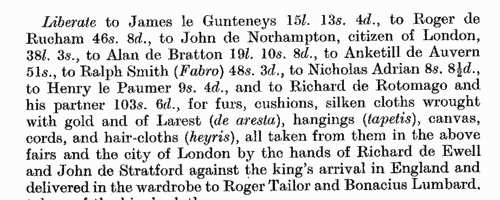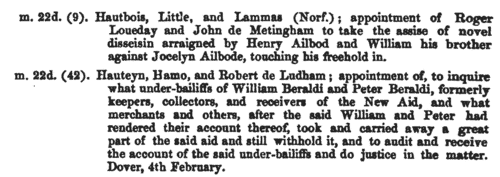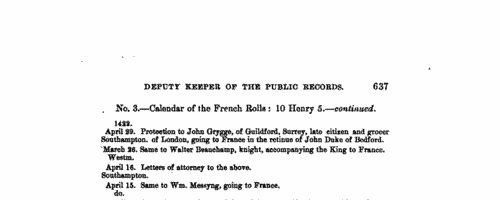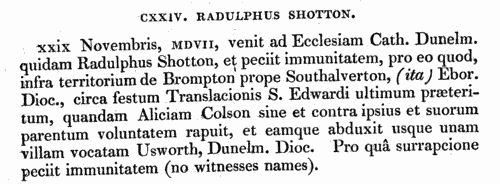Elmeden Surname Ancestry ResultsOur indexes 1000-1999 include entries for the spelling 'elmeden'. In the period you have requested, we have the following 9 records (displaying 1 to 9): Buy all | | | Get all 9 records to view, to save and print for £36.00 |
These sample scans are from the original record. You will get scans of the full pages or articles where the surname you searched for has been found. Your web browser may prevent the sample windows from opening; in this case please change your browser settings to allow pop-up windows from this site. Liberate Rolls
(1251-1260)
These chancery liberate rolls of the 36th to 44th years of the reign of Henry III of England record the details of payments and allowances as part of the administration of government. Most entries start with the Latin words 'liberate', meaning 'deliver', or 'allocate', meaning allow. There are also 'contrabreves', warrants mainly to sheriffs of shires, assigning them tasks and allowing expenses. Most of the entries relate to England and Wales, but there are occasional references to Ireland and the English possessions in France.ELMEDEN. Cost: £4.00.  | Sample scan, click to enlarge

| Patent Rolls: entries for Warwickshire
(1277-1278)
Calendars of the patent rolls of the reign of king Edward I are printed in the Calendars of State Papers: but these cover only a fraction of the material on the rolls. From 1881 to 1889 the reports of the Deputy Keeper of the Public Record Office also include calendars of other material from the rolls - about five times as many entries as in the State Papers - predominantly mandates to the royal justices to hold sessions of oyer and terminer to resolve cases arising locally; but also other general business. The calendar for the 6th year of king Edward I [20 November 1277 to 19 November 1278], hitherto unindexed, is covered here.ELMEDEN. Cost: £6.00.  | Sample scan, click to enlarge

| Fine Rolls
(1369-1377)
The fine rolls of the 43rd to 51st years of the reign of king Edward III record part of the government administration in England, with orders sent out day by day to individual officers, and commitment of particular responsibilities and duties. There is also some material relating to Wales, Scotland, Ireland and the English possessions in France. ELMEDEN. Cost: £4.00.  | Sample scan, click to enlarge

| Norman Rolls
(1200-1417)
The dukedom of Normandy is one of the appendages of the English crown, but actual possession of the dukedom was actively contested by the kings of France. During the periods of English power records were kept for Normandy similar to those of the royal administration in England, with enrolment of letters and grants of liberties and privileges and confirmations of previous enjoyed rights. The rolls for 1200 to 1205 and during the reassertion of English rule under Henry V in 1417, were edited by Thomas Duffus Hardy for the Commissioners of the Public Records, and published in 1835. Most of the persons mentioned are French inhabitants of Normandy or Englishmen in France, but there is also a long section (from page 122 onwards) of valuation of lands of Normans in England, where English jurors, county by English county, attest to acreage, numbers of cattle &c.ELMEDEN. Cost: £4.00.  | Sample scan, click to enlarge

| The English in France
(1421-1422)
King Henry V of England claimed the throne of France (and quartered the fleurs-de-lis of France with the lions of England on the royal standard) as had his predecessors since Edward III, as descendants of Philip IV of France. He married Katherine, youngest daughter of king Charles VI of France in 1420, and thereafter styled himself 'heir and regent of France'. The English had real power or influence in Brittany, Normandy, Flanders and Gascony, and actual possession of several coastal garrisons, in particular Calais, where the French inhabitants had been replaced by English. The English administration kept a series of records called the French Rolls. On these are recorded royal appointments and commissions in France; letters of protection and safe-conduct to soldiers, merchants, diplomats and pilgrims travelling to France from England and returning, and to foreign legations. There are also licences to merchants to export to the Continent, and to captains to transport pilgrims. This calendar of the French Roll for the 9th year of the reign of Henry V (21 March 1421 to 20 March 1422) was prepared by Alexander Charles Ewald and published in 1883. ELMEDEN. Cost: £6.00.  | Sample scan, click to enlarge

| Murderers sheltering in Durham Cathedral: and their victims
(1464-1524)
Criminals could evade pursuit by claiming sanctuary in Durham Cathedral. Persons who took refuge fled to the north door of the cathedral, and knocked for admission. There were two chambers over the door in which men slept, for the purpose of admitting fugitives at any hour of the night. As soon as anyone was so admitted, the Galilee bell was immediately tolled, to give notice that someone had taken sanctuary. The offender was required to declare before witnesses the nature of his offence, and to toll a bell in token of his demanding the privilege of sanctuary. He was then provided with a gown of black cloth with a yellow cross, called St Cuthbert's Cross, upon the left shoulder. A grate was provided near the south door to sleep upon, and for 37 days sufficient provisions and bedding were provided. But within 40 days he had to appear before the coroner, clothed in sackcloth, and be branded on his right hand with the sign of the letter A. This signified that he was swearing to abjure the realm: he was then free to leave the country unhindered. The petitions for immunity were entered in the diocesan registers, usually with the marginal note 'Peticio Immunitatis': those from 18 June 1464 to 10 September 1524 (the privilege was finally abolished in 1624) were edited and printed by the Surtees Society in 1837 under the title Sanctuarium Dunelmense. Some of the criminals came from a considerable distance: the great majority were murderers or homicides. Each entry usually gives full name, original address, (often) trade, a brief description of the crime, often with date, and usually the name of the victim, as well as the witnesses to the petition. This index covers all the surnames given.ELMEDEN. Cost: £4.00.  | Sample scan, click to enlarge

| Tradesmen of York
(1272-1558)
No man or woman could trade in the city of York without having obtained 'freedom' of the city.Their names were recorded on the 'Freemen's Roll', or Register of the Freemen of the City of York, which contains about 19,900 names for this period. A list of names was prepared for each year, the year being here reckoned as starting at Michaelmas (29 September) until 1373, and thence at Candlemas (2 February). Each annual list starts with the name of the mayor and the camerarii or chamberlains. The chamberlains were freemen charged with the duty of receiving the fees of the new freemen; of seeing that only freemen traded in the city; and of preparing this roll, which was compiled from the names on their own account books from the receipts for the fees. There are three groups of freemen: those who obtained freedom after serving out an apprenticeship to a freeman; the children of freemen; and those who claimed freedom by 'redemption', i. e. by purchase or gift from the Mayor and Court of Aldermen.
ELMEDEN. Cost: £2.00.  | Sample scan, click to enlarge

| London Marriage Allegations
(1521-1610)
London, Essex and part of Hertfordshire lay within the diocese of London. In the later 17th century the individual archdeaconry courts issued marriage licences, but for this period the only surviving material is from the overarching London Consistory court. The main series of marriage allegations from the consistory court starts 7 December 1597, and these were extracted by Colonel Joseph Lemuel Chester; Colonel Chester then discovered earlier material, back to 5 January 1521, in Vicar-General's Books of the Principal Probate Registry. The notices in these books were much briefer, but as well as extending back so much earlier, they included additional material for 1597 onwards. All this he collated with the consistory court extracts, and the text was edited by George J. Armytage and published by the Harleian Society in 1887. A typical later entry will give date; name, address and occupation of groom; name, address and condition of his intended bride, and/or, where she is a spinster, her father's name, address and occupation. Lastly we have the name of the church where the wedding was going to take place; or the words Gen. Lic. signifying a general or open licence.ELMEDEN. Cost: £4.00.  | Sample scan, click to enlarge

| Tradesmen of York
(1559-1759)
No man or woman could trade in the city of York without having obtained 'freedom' of the city. Their names were recorded on the 'Freemen's Roll', or Register of the Freemen of the City of York, which contains about 16,600 names for this period. A list of names was prepared for each year. Each annual list starts with the name of the mayor and the camerarii or chamberlains. The chamberlains were freemen charged with the duty of receiving the fees of the new freemen; of seeing that only freemen traded in the city; and of preparing this roll, which was compiled from the names on their own account books from the receipts for the fees. There are three groups of freemen: those who obtained freedom after serving out an apprenticeship to a freeman; the children of freemen (per patres); and a handful who claimed freedom by 'redemption', i. e. by purchase or gift from the Mayor and Court of Aldermen.
ELMEDEN. Cost: £2.00.  | Sample scan, click to enlarge

|
Research your ancestry, family history, genealogy and one-name study by direct access to original records and archives indexed by surname.
|











